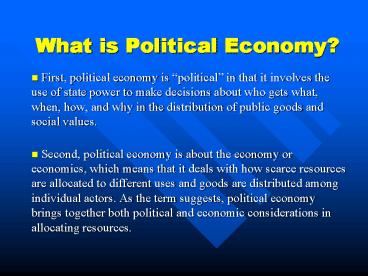What is Political Economy PowerPoint PPT Presentation
1 / 11
Title: What is Political Economy
1
What is Political Economy?
- First, political economy is political in that
it involves the use of state power to make
decisions about who gets what, when, how, and why
in the distribution of public goods and social
values. - Second, political economy is about the economy
or economics, which means that it deals with how
scarce resources are allocated to different uses
and goods are distributed among individual
actors. As the term suggests, political economy
brings together both political and economic
considerations in allocating resources.
2
Case Studies
- First case The Federal Reserve system or the
budget - Second case The U.S.-China dispute over MFN
and human rights - Third case The Arab Oil Boycott of 1973 and 78
- Fourth case Globalization
3
What is the focus of the study of PE?
- The interaction between the state and the market
- By state we usually refer to the political
institutions of the modern nation-state, a
geographic region with a well-defined territory
and population and a coherent and autonomous
system of government capable of making collective
decisions and exercising sovereignty, including a
coercive apparatus and the legitimate use of
physical force to administer control over the
population within its territory. - By market we usually mean the economic
institutions of modern economy, which are
dominated by individual self-interest and
conditioned by the invisible hand of market
forces through the balance of demand and supply.
4
The interaction between states and markets?
- Central Questions
- what is the nature of the relationship between
states and markets? - How the two interact with each other?
5
Conflictual or Unconflictual
- When unconflictual?
- When states and markets have similar goals or
driven by similar interests and values - When conflictual?
- When the motives and values of states and markets
differ
6
Why the two often conflict in IPE?
- efficiency vs. fairness
- freedom vs. equality
- self-interest vs. common interest
7
Does the relationship between states and markets
look similar or different in different political
economies?
- In a free market economy
- In a centrally planned economy
8
Power
- Power is the ability to control or influence the
minds and actions of others and affect or
determine outcomes. - Power (politics) and wealth (economics) are often
intertwined and interact with each other. - Relational power vs. Structural power
9
Contending Theories
- Liberalism/Capitalism
- a political and economic theory that emphasizes
the freedom of the autonomous individual, the
system of private property and self-regulating
markets, and the pursuit of individual interest.
10
Contending Theories
- Marxism and Communism
- a political and economic theory that is
influenced by the political and economic
philosophy of Karl Marx and his methodology of
class analysis that emphasize the system of class
domination and class interest, the value of
equality, and the social cooperation and social
ownership based on universal humanity.
11
Contending theories
- Corporatism
- It refers to a theory that seeks to bring about
the institutions and practices that involve a
system of interest representation or a kind of
state-society relationship that is controlled and
regulated by the state, the requirements of the
law, or the predominant social norms, and their
interactions are incorporated into the formal
structures of the state, monitored and guided by
the state in modern society or political
authority in traditional society.

